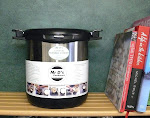 This Indian biriani, adapted for the Shuttle Chef, can be served on its own as a scrumptious meal, or dressed up for a festive occasion with fresh tomato chutney, vegetable curry side-dishes and crunchy popadoms. The lamb (mutton) needs to marinade for an hour at least (overnight if convenient). If you are cooking in the morning and want to save time
This Indian biriani, adapted for the Shuttle Chef, can be served on its own as a scrumptious meal, or dressed up for a festive occasion with fresh tomato chutney, vegetable curry side-dishes and crunchy popadoms. The lamb (mutton) needs to marinade for an hour at least (overnight if convenient). If you are cooking in the morning and want to save time
then brown the onions the night before.
Ingredients for 6 - 8 servings (halve the ingredients for 3 people).
- 1 kilo lamb (or muttton) cut into 2 cm cube pieces (I prefer shoulder)
For the marinade
- 4 green chillies (seeded and finely chopped)
- Coriander leaves (chopped - about 1 cup full)
- 1 clove garlic (crushed with salt)
- 2 teaspoons cumin powder
- 1 teaspoon chilli powder
- 1 teaspoon garam masala
- 1 small carton plain yoghurt (approximately 2 large serving spoons)
For the biriani:
- 4 medium onions (thinly sliced)
- Oil or ghee (about 1 desertspoon)
- 1/2 kilo potatoes (can be either old potatoes peeled and cut into large chunks, or new potatoes halved)
- Pinch of saffron (optional, but adds a suble flavour)
- 3 cups of long grain Basmati or Patna rice
For garnish
- 100 gms cashew nuts (or shredded almonds)
- 125 grams sultanas
Method:
- Cut the lamb (mutton) into cubes.
- Chop the chillies finely, crush the garllic, chop the coriander leaves and mix all with the spices and yoghurt.
- Coat the meat with the marinade, cover and put in the fridge for 1 hour or longer.
- Chop the onions, then fry in ghee or oil until golden with some browning (they should taste sweet). Remove from pan.
- Add a little ghee or oil to the pan and heat marinaded lamb to seal the meat. (I prefer to add the meat a third at a time so that it is easier to turn.)
- When the lamb is simmering hot, add the potatoes and 1/2 the fried onions. Stir well and bring back to simmer.
- Mix the rice with 5 cups of boiling water and 1 desertspoon of salt.
- Put the saffron in 1/2 cup hot water.
- Stir 1/2 the rice into the lamb and potatoes, then spoon the other 1/2 of the rice and water on top.
- Sprinkle the saffron water onto the top of the rice.
- Make sure it is all simmering hot, put the lid on the Shuttle Chef pan and place it in the Shuttle Chef.
- Leave to cook in the Shuttle Chef for 2 1/2 hours to get really tender, succulent meat. (You can leave the biriani cooking in the Shuttle Chef for up to 7 hours - the tatse is superb and the rice is still separate.)
To serve
Heat the remaining 1/2 of the browned onions, then add the nuts and sultananas. Stir occasionally until heated (the sultanas will plump). Open the Shuttle Chef and stir the onion, nuts and sultana garnish into the top layer of rice. Serve with Tomato Chutney.
Tomato Chutney
- 1 small green chilli (deseed and chop very finely)
- 1/2 medium onion (chop finely) I prefer sweet red onion.
- 3 large or 4 medium toamtoes (chopped)
- 1 desertspoon vinegar1 teaspoon sugar
- Good pinch salt
Method:
Stir all ingredients together, cover and leave in a cool place for flavours to blend.









.jpg)
-01.jpg)
-Fruit-C.jpg)






